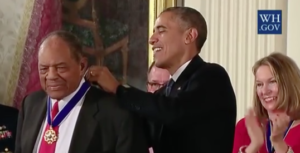Thank you Willie Mays, who turned 86 Saturday, for what you brought to our national pastime with your everyday skills that make you arguably the best to ever play the game of baseball
No one has ever done what the “Say Hey Kid” accomplished in 22 years

Commentary by Arnie Leshin | May 7, 2017
These are not the best of times for Willie Mays, but he’ll never let you know it.
His eye sight is limited, and some say he can only see shadows. He can’t get around like he once did, but doesn’t mind taking short trips. But it’s good to know that his hearing is still in good working order.
But he’s a proud man and doesn’t care to inform people how he’s doing now, only wants them to remember his legendary career on the baseball diamond.
And it’s good to know that this legend, arguably the best baseball player in history, is still with us on his May 6th birthday, to which we should say, Happy 86th Birthday Willie Howard Mays, Jr.
Yes, time does fly, but in Mays’ case, it doesn’t take much time to run down his career baseball statistics. Not if you grew up during the 22 years that Mays played the game like no one else did.
I did, except that I grew in a borough that worshiped the Brooklyn Dodgers. All my friends rooted for the team that played at Ebbetts Field in Flatbush, but I liked the team from the Bronx, the Yankees, that is, until 1951.
That’s when the team from Upper Manhattan, the Giants, brought up an 18-year-old Mays from their minor league team in Minneapolis, where he was hitting .477.
It didn’t take long for the youngster to become the toast of the town. He was named Rookie of the Year. He played centerfield with grace, range, speed, and a strong right arm. He sped to first base even if it was an apparent out.
He could lay down the bunt, run the bases, hit with power, hit to the opposite field, and turn an outfield gaper into a triple with his daring base running.
He could do it all and he just arrived. He hadn’t even introduced his basket catch yet. He was still learning the game and I adopted him.
When the hated Giants would play the Dodgers in Brooklyn, I tagged along with my Dodger friends just to watch Mays play. I remember one friend had his mouth wide open when Mays made a remarkable running catch and threw out the base runner at home plate with a one-hop throw.

In October of 1951, the Dodgers met the Giants in a best 2-of-3 playoff after the two tied following the regular season. The rest is history. The Giants won game one at the ancient Polo Grounds, the Dodgers evened things by winning game two at Ebbetts Field, and game three at the Polo Grounds involved sneaking out of my house, meeting three of my friends at the subway station, and riding the A train to Upper Manhattan.
We paid $2.25 each for four bleacher seats, and in batting practice I reached for a ball hit by the Giants’ Don Mueller heading our way and broke my middle finger on the left hand. Now I had to figure out how to explain this to my parents.
But first that historic finish …
The Dodgers scored three runs in the top of the seventh to take a 4-2 lead as the Giants batted in the last of the ninth with the season on the line before their faithful home fans. Brooklyn starter, hard-throwing right-hander Don Newcomb, was relieved by Ralph Branca.
Giant shortstop Alvin Dark led off with a single to right field and first baseman Whitey Lockman followed with a double down the first base line and it was now first and third with left fielder Monte Irvin coming up. But on a 1-1 count, Irvin popped up to the catcher.
With Mays and his bat kneeling on desk, up came third baseman Bobby Thompson from the borough of Staten Island. On a 1-1 count, Thompson sent the ball toward the 325-feet left field lower stands.
After it landed, Giants broadcaster Russ Hodges dropped his scorebook, the manual scoreboard had already removed the final score, and so Hodges, not knowing the final score, just kept saying, “The Giants win the pennant,” over and over and over and over, “The Giants win the pennant.”
With all this happening in front of him, Mays remained on deck thinking the score was tied. It took his roommate, Irvin, to tell him that the Giants won.
Oh, and I told my parents that I broke the finger playing stickball in the playground.
When I first met Mays, I was a sportswriter with the Jersey Journal in Jersey City, right across the Hudson River. It was 1973 when the Mets’ owner Joan Payson brought Mays back to New York. It became his next-to-last year.
The Met fans adored him, but he wasn’t the Mays of old. He had slowed down, didn’t have the range he once had, and once stumbled out of the batter’s box and was easily thrown out.
But his new team had won the pennant, went against the Oakland A’s in the World Series, and lost four games to three. In 1974, the Mets held a Willie Mays Night. I was there to interview some of the spectators that turned out to fill Shea Stadium. It was not only a Willie Mays crowd, but fans who realized just how fortunate it’s been to watch this legend. He received ovations after ovations.
At the microphone, he spoke with emotion, with his final words, “Goodbye to baseball.”
It’s not how good he was, it’s how “great” he was. With all due respect to Babe Ruth, Mays performed like no one else. He spent 1952-53 in the U.S. Army, and when he returned he introduced the basket catch. He was better than ever and the 1954 Giants won the pennant and swept the Cleveland Indians in four games.
In 1979, Mays was inducted into the Baseball Hall of Fame before a huge turnout in Cooperstown, N.Y.
When you check out his stats, it’s obvious he did it all, more than anyone else. Ruth was a home run hitter, a very good pitcher early in his career, a fan favorite, but he and no one else can compare to what No. 24 brought to the game.
He brought color, excitement, leadership, tons of talent, excelled in all phases of the game, and even received big ovations in road games.
He played 22 seasons in the majors, 20 with the Giants in New York and San Francisco, and his last two with the Mets in Queens.
He never received his worth, never getting paid like the salaries that you see now. His top pay check amounted to $800,000, and that was in 1962 when the fans in San Fran finally gave him his due, accepted how elite he was, and now there’s a statue of him as you enter the stadium. He played for the love of the game and this was acknowledged throughout his career.
Check this out. He is fifth-best in home runs with 660, third in runs with 2,062, fifth in hits with 3,283, he knocked in 1,900 runs, played in a record 24 All-Star Games (In three seasons, they played this event twice). His gift with the glove brought a dozen Golden Gloves.
He was the first one to reach 100 home runs and 300 stolen bases, he led the league five times in slugging, and four times in stolen bases. Three times he led the league in home runs and batting average. He was named Most Valuable Player in 1954 and 1965.
He became the “Say Hey Kid,” in 1954 when sportswriter Barney Kreminko of Newsday in Long Island gave him the tag because that’s all that young Mays usually said, and “Say Hey” has lived forever.
Those that played against or with Mays will argue for hours on the subject of who was the best to ever play the game, and it was difficult in discussion to find anyone better than Mays. If you saw him play, you wouldn’t hesitate to give him the honor.
Yes, he was a legend, is still a legend, and ages like everybody else does, but he will never be forgotten for his elite role in our National Pastime.
Say hey Willie, hope you had a warming May 6th.

 SantaFeToday.com Santa Fe’s Hometown News
SantaFeToday.com Santa Fe’s Hometown News

